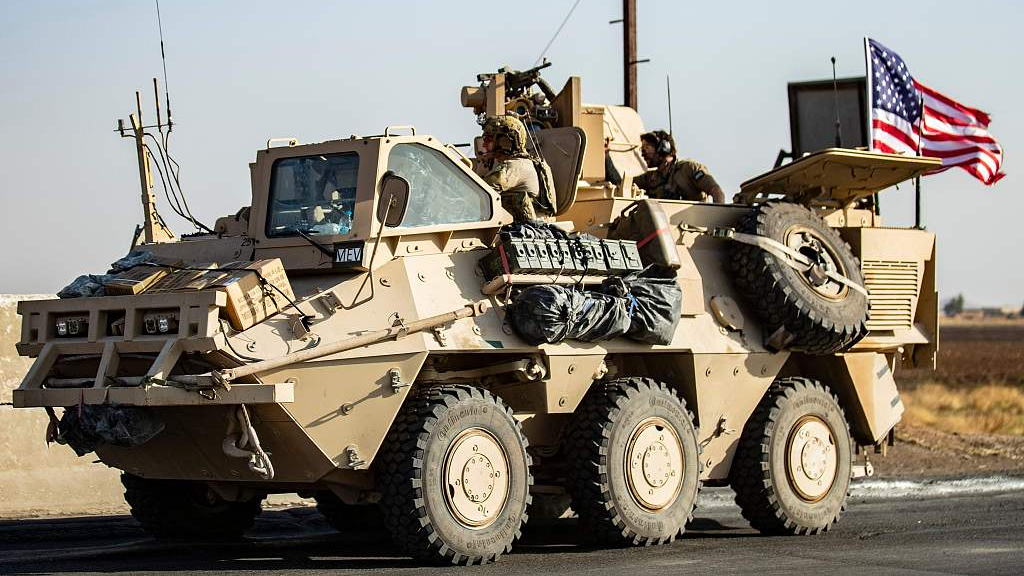
Editor's note: Azhar Azam works in a private organization as a market and business analyst and writes about geopolitical issues and regional conflicts. The article reflects the author's opinions and not necessarily the views of CGTN.
Just a month after Palestine National Council (PNC) – the legislative body of the Palestine Liberation Organization (PLO) in exile – recognized Israel to push it for a two-state solution in 1988, the chairman of the two bodies Yasser Arafat drafted a two-page declaration with a group of American Jews to formally accept Israel.
The PLO changed its stance and gave up its prior demand for control over the entire territory and agreed to settle for only 22 percent of the land within the 1967 lines. Palestinians – who had seen their sovereignty shrink through the Peel Commission (1936-37), the United Nations Partition Plan (1947) and the Arab-Israel War (1948-49) – refused to endorse the move and called it a "historic compromise."
Nevertheless the epoch-making decision, through the second year of Intifada, drew Israel into peace talks with Palestinians in Norway. But PLO support for Iraqi President Saddam Hussein during the first Gulf War annoyed its Arab allies and allowed Israel to capitalize on Arafat's weak position in 1993 secret negotiations.
While the PLO struggle to end Israeli settlements in the occupied West Bank and Gaza Strip was set aside by Israel in Oslo – the assassination of the Israeli Prime Minister Yitzhak Rabin in 1995 by a right-wing Jewish activist delivered a coup de grace to his "land for peace" formula – vowing to withdraw Israeli forces from the occupied Palestinian territory to ensure peace in the region.
Other peace agreements – such as Camp David Summit 2000, Arab Peace Initiative 2002-03, Annapolis Conference 2007 and Kerry peace efforts 2013-14, UNSC resolution 2334 in December 2016 – unanimously expressing Israeli settlements in Palestinian territory as a "flagrant violation under international law and a major obstacle to the achievement of two-state solution" and a joint reaffirmation of more than 70 countries and international organizations for a long-lasting and negotiated two-state solution at Paris peace conference in January 2017 couldn't resolve the thorny Israeli-Palestine conflict either.
Firing back at the UN resolution, Israel recalled its ambassadors from New Zealand and Senegal, two of the nations proposed the resolution along with Malaysia and Venezuela, which did not maintain diplomatic ties with Israel. It summoned the U.S. envoy and chided the Obama administration for abstaining and failing to protect Israeli interests in the UN.
Benjamin Netanyahu, during his election bid in 2019, went an extra mile and asserted to annex the Jewish settlements in the occupied West Bank and extend Israeli sovereignty "over the Jordanian Valley and northern Dead Sea." His threat to undermine peace was backed by the Trump administration, which abandoned the U.S. position that the Israeli settlements in the occupied West Bank were "inconsistent with international law."
Since the Israeli leaders have already been calling for annexation of the entire West Bank, ignoring the rights of 2.5 million Palestinians living there in addition to nearly two million facing siege in Gaza Strip, the U.S. retreat from its longstanding official stand could hammer another nail in the coffin of the two-state solution and sustainable regional peace.
In January 2020, U.S. President Donald Trump unveiled his vision for peace, prosperity and a brighter future for Israel and Palestinian people through political and economic frameworks. It pledged to secure the possibility of a two-state solution and realize the aspirations of Palestine independence, self-governance and national dignity.
This time, the Palestinian political groups and people rejected the peace plan in chorus as the so-called "deal of the century" authorized Israel to annex around 30 percent of the Palestinian territory in the West Bank, quashed Palestine's entire claim on Jerusalem, made it an "undivided capital" of Israel and prohibited Palestinian refugees from returning to their homes in Israel.

A U.S. military vehicle patrols a road near the town of Tal Baydar in the countryside of Syria's northeastern Hasakeh province, October 12, 2019. /VCG
A U.S. military vehicle patrols a road near the town of Tal Baydar in the countryside of Syria's northeastern Hasakeh province, October 12, 2019. /VCG
Heaping reproach on thevVision, the UN Special Rapporteur Michael Lynk said the proposal ratified "the creation of a 21st century Bantustan in the Middle East" and "would turn the rules-based international order on its head," entrenching the "tragic subjugation" of the Palestinians and favoring realpolitik, power and conflict management over rights, justice and conflict resolution.
But the "lopsided" plan certainly has achieved one of its key objectives, to normalize relations between Israel and its neighbors. Two major Arab nations, Bahrain and the United Arab Emirates (UAE), have now established diplomatic ties and intense speculation are hanging around Saudi Arabia about following the footsteps of its allies.
Following an alleged meeting between Saudi Crown Prince Mohammad bin Salman, Trump's adviser, son-in-law and architect of the Middle East peace plan Jared Kushner travelled to Qatar and met Emir Hamad bin Khalifa Al Thani to moderate Doha-Riyadh rifts and accelerate the normalization process with Israel, keeping an eye to build a regional alliance against Iran.
Any shuttle diplomacy to defuse the warlike situation in the Middle East is a welcome sign for peace and stability in the conflict zone nonetheless it shouldn't give the look of developing an aggressive alliance against Iran. Washington needs to realize that Tehran is an important regional country and no peace initiative could succeed without its involvement.
One of the Saudi worries has been the Doha-backed Muslim Brotherhood, the transnational Sunni political Islamic movement, outlawed by Riyadh and Abu Dhabi over national security concerns. In June 2017, the Saudi-led quartet including Bahrain, Egypt and the UAE severed ties and froze all means of communications with Qatar, accusing it for housing terrorist and sectarian groups including the Brotherhood.
Qatar and Saudi Arabia are trying to mend their relations yet it isn't clear how Doha would pacify Riyadh on the Brotherhood, the nub of the issue between them. It is going to be a daunting task since the clerics from both the sides have had a fierce exchange to describe the other the "deviant group" or a "sycophant" body.
In addition, Doha maintains a close relationship with Tehran and the two sides recently signed a MOU to boost cooperation in the areas of energy, water, gas, communications and information technology. While Iran generally has stable relations with Turkey and the UAE also doesn't want any conflict with either of the two, a realistic progress on peace could only be achieved through engagement with Tehran or at least avoiding to forge any bloc against it that could exacerbate existing tensions and brew new conflicts.
In order to pull off a durable peace prospects in Middle East, the regional countries should stop seeking domination over each other or looking broadening their clout and keep focus on finding the two-state solution to the Israel-Palestine conflict under the UN charter with a positive mindset, which would essentially calm frictions among them.
The "land for peace" exemplified more than a couple decades before the two-state solution had the potential to bring peace in the region and there is every reason to believe that its renaissance can cool off the growing hostility within the Gulf nations again, transforming the fate of the Middle East and Palestinians.
(If you want to contribute and have specific expertise, please contact us at opinions@cgtn.com.)

